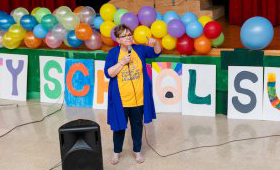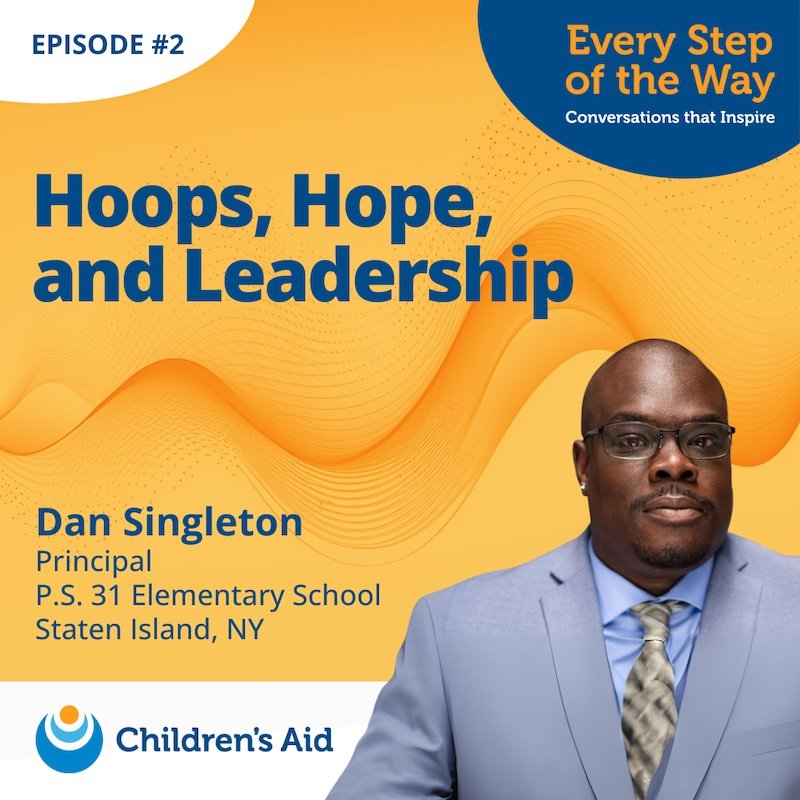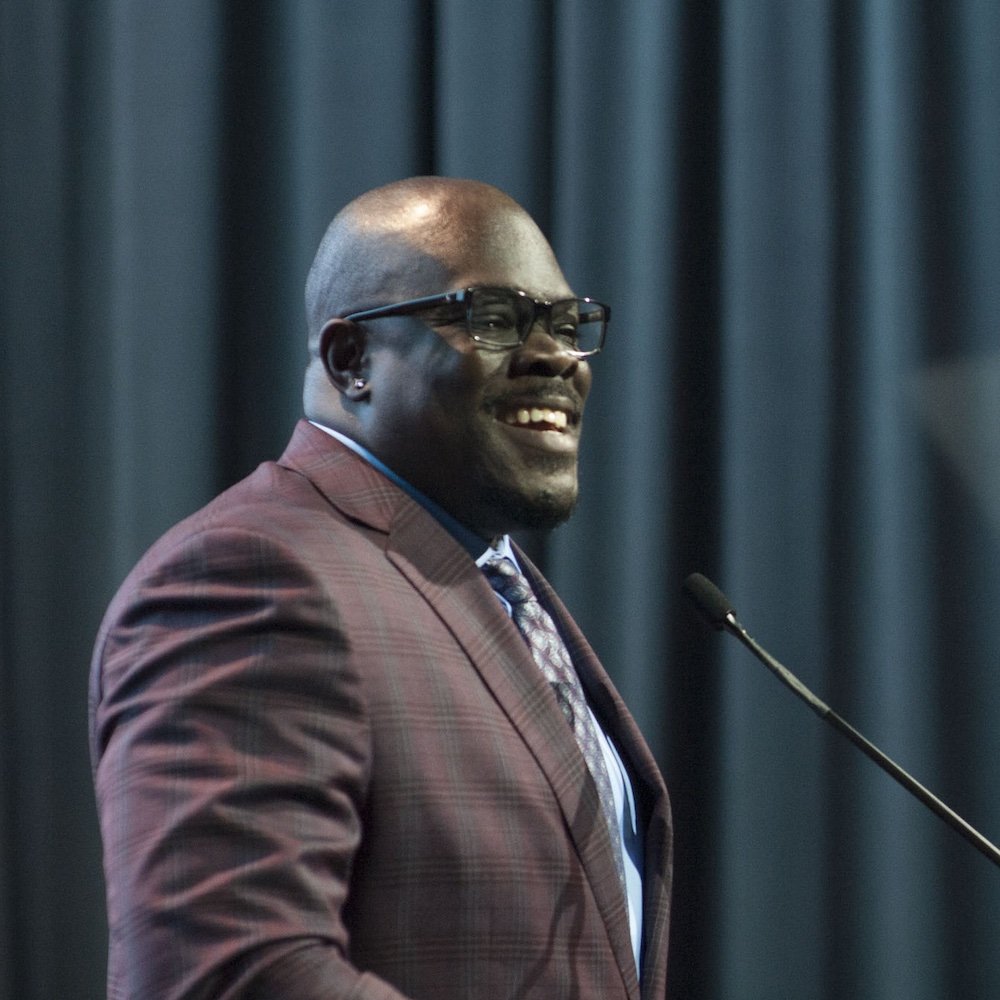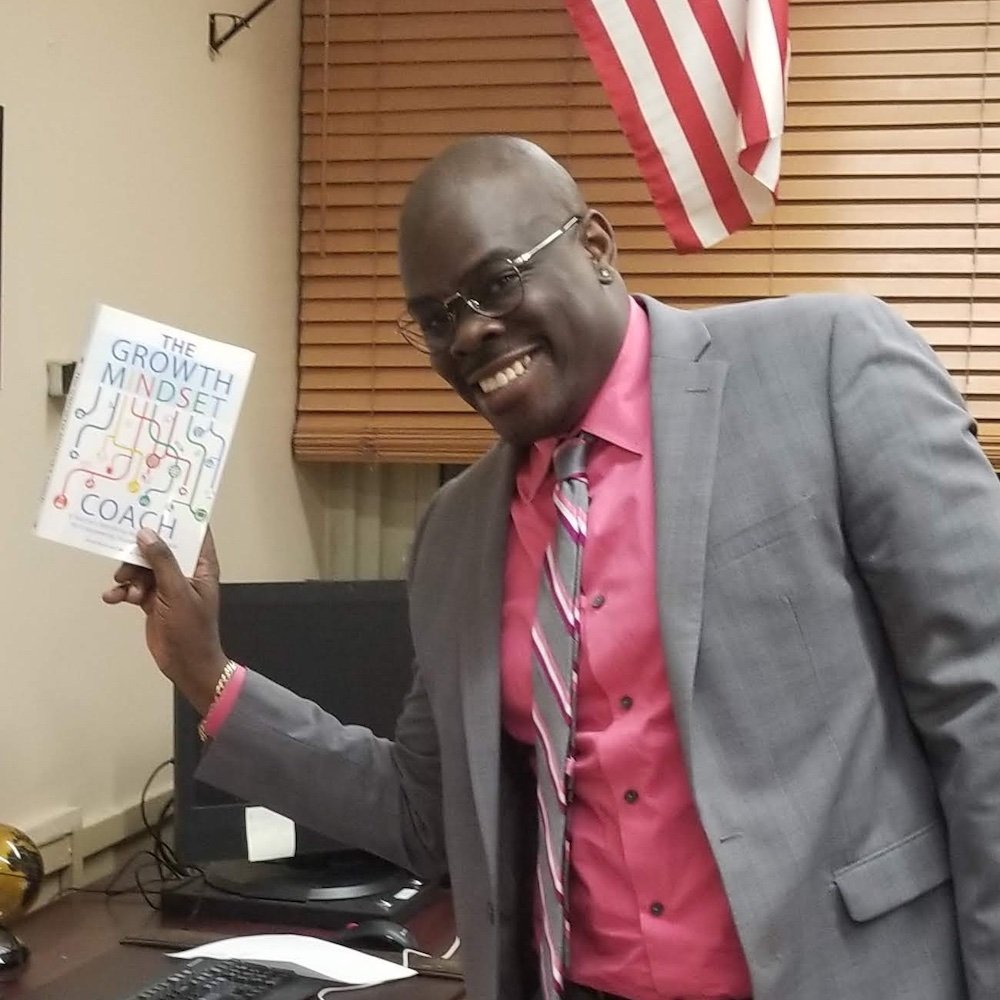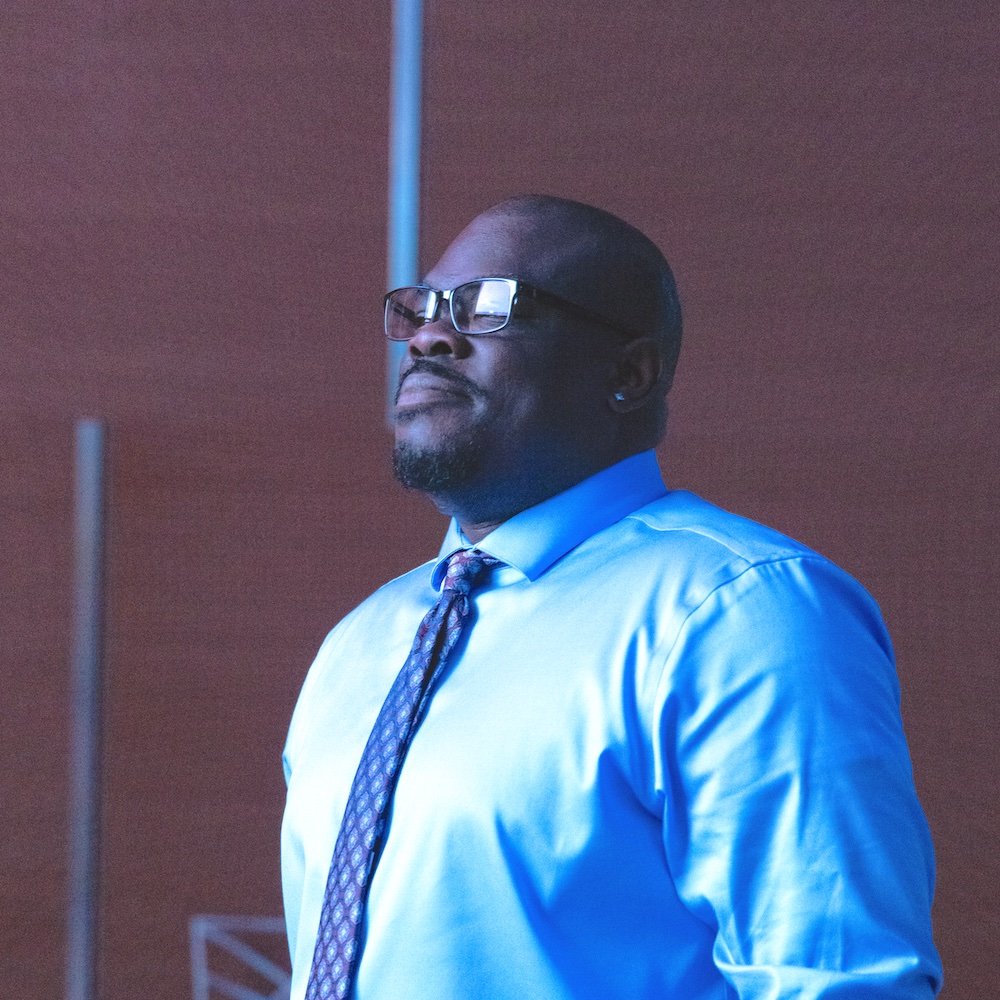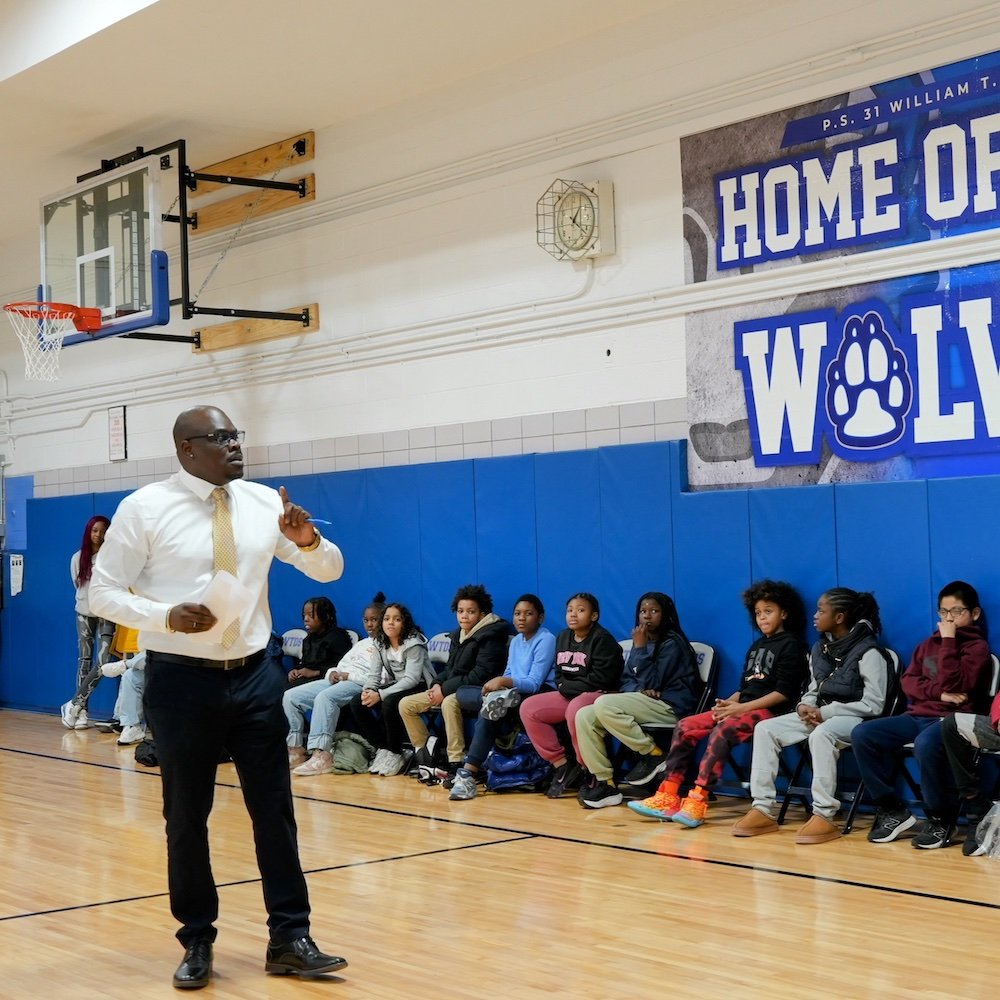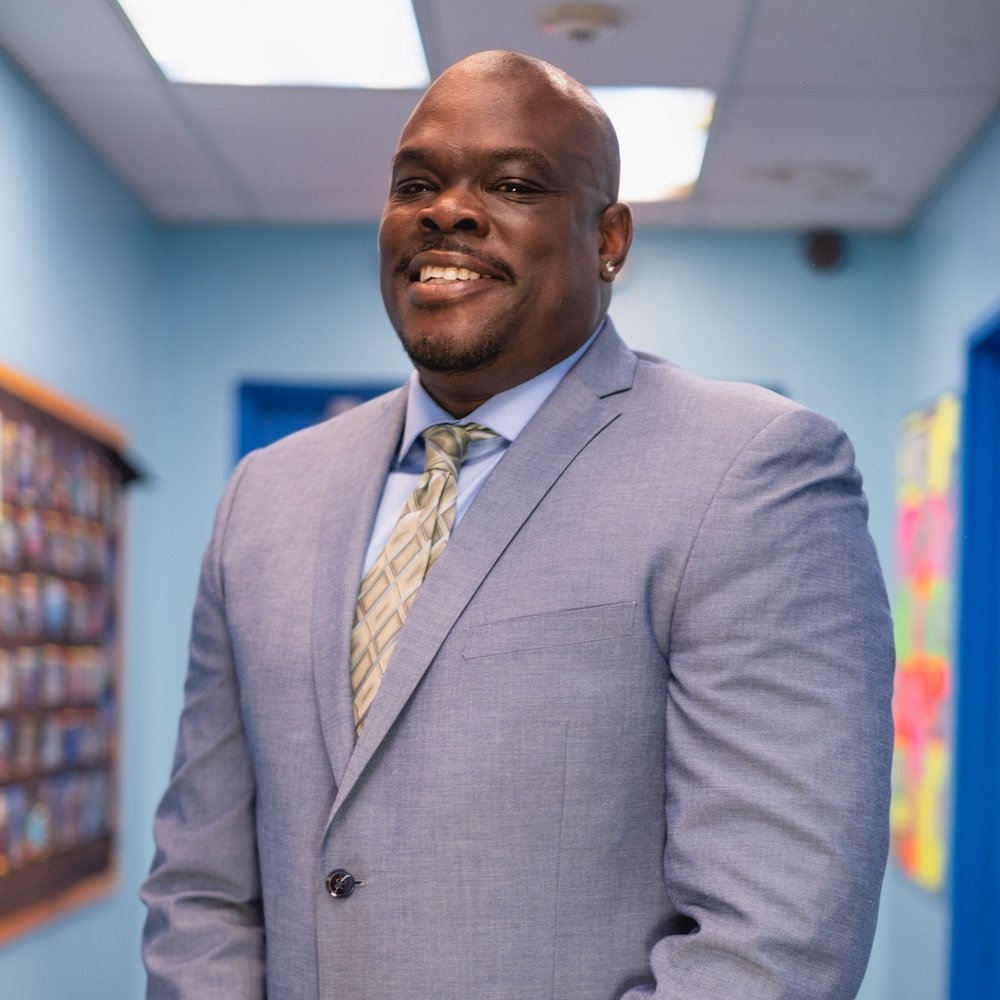Georgia Boothe: [00:00:00] Hey, Sandra.
Sandra Escamilla: Hey, Georgia. How you doing?
Georgia Boothe: I'm good. How are you? I'm so glad we're here today.
Georgia Boothe: I loved hearing about Frances's story and I can't wait to hear about our next guest's journey, having been a participant in Children's Aid and where he is right now.
I love people's stories, and I can't wait to hear his.
Sandra Escamilla: Yeah, me too. I mean, he was at our gala two years ago and there's a lot of questions I have about like how he arrived at his principalship, especially some of the choices he made because he grew up around the same era that we did, right?
Eighties and nineties during the crack epidemic. And there are a lot of people that made decisions to do the type of work we do and he's one of them. So, I'm excited.
Georgia Boothe: And there are a lot of young adults during that time who've made very different decisions. Right. And so, I'm excited that he's here [00:01:00] and why don't we just go ahead and welcome Daniel Singleton, who's currently the principal at P.S. 31, a middle school on Staten Island. Daniel, welcome to the Children’s Aid podcast, Every Step of the Way. So happy to have you.
Dan Singleton: Thank you for having me. I'm so happy to be here today. It's always a pleasure. It's always a privilege and a pleasure to come back and speak about my roots. So, I'm happy to be here today.
Sandra Escamilla: Great. Great. Now, do you prefer for us to call you Dan or Daniel?
Dan Singleton: It's so funny you say that because it depends on a certain period of my life. If you call me Dan, then you know me as a principal. If you call me Daniel, then you know me as an AP. And if you call me Shady, you're family. So, if someone says, “Hey Shady”, I know they've known me for a long time. Dan is fine.
Sandra Escamilla: Yeah. Well, you know what, after this interview, I hope at the end, we can call you Shady. [00:02:00]
Dan Singleton: Yeah.
Georgia Boothe: I hope so, too.
Sandra Escamilla: Great. Great.
Georgia Boothe: All right. So, Dan, we're going to go back a little bit with you. Tell us a little bit about yourself and how did you become involved with Children's Aid.
Dan Singleton: So, when I was a child I lived in a neighborhood that was, it was pretty rough. It was a place that there's a lot of things going on outside of in the neighborhood. My mom worked two, three jobs at a time.
She was never home and she went about the business of securing places for me to go that would allow my brother and I to keep us safe. And I tried after school program after school in the school. I went to P.S. 16. I went to P.S. 45. They had a program.
She heard about a program at the Goodhue Center that allowed us to go after school and they sent a bus to get us and I would go. No, actually the bus went towards my house and then it was in the middle of my house and the Goodhue Center so I could get off the bus and I would go there every day. And my mom felt safe [00:03:00] sending me to this place and she called and signed me up.
And then I was, I went from maybe third grade and then I went on to work there as well. So, I went there from third grade to like fifth grade, sixth grade. Then, I played basketball there. That's where I first learned to play basketball. I went there after school and then I went at night to do night center where we played basketball and just did other rec things like cooked. Play video games. That was the time where video games weren't as prolific as they are now. So, some pac man and things like that. And I was amazed by those things and it kept me coming back, not realizing that it kept me safe and off the street. So, it started with the school and then it went from there to night center.
And then sports programs. And then after that, in the summer times, I was a camper. So, I went as a camper. And then after that, I also worked at the Children’s Aid Society in the summer. I went from a camper to a [00:04:00] CIT, to a counselor, to kind of a quasi director. So, I went through, I went through many different roles with the Children’s Aid Society.
And even in college I came home to work in the summer as well.
Sandra Escamilla: Is there one program that stands out to you that you're like, this is the thing.
Dan Singleton: That's a perfect question because I think that Children's Aid actually set me off on a career that well, the sports career because it's the first place I ever played basketball.
So, like playing basketball with a uniform on. I think I spoke about that a couple of years back. It's the first place I ever put on a uniform and learned that basketball was a real thing and not just something on TV and it had referees and it had rules and it's the first place that I learned to play now.
I knew how to play, but to play on a team with a uniform meant everything to me. And then I realized that that's what I wanted to do. So, I would say that the night program helped the most when my mom let me go to that, cause I had to walk. And she, she was very wary about that. But I said, mom, I got to play at a [00:05:00] game and she let me go.
But that made the biggest difference because it set me on my path.
Sandra Escamilla: What position did you play? Just curious.
Dan Singleton: I was a point guard and a shooting guard and I love shooting guard cause I love to shoot. So, I shoot that ball all the time. I played both positions, I'm 6’2”. I was in high school. I was 6’2” from my sophomore year to my senior year. So, I kind of played all positions and which was good because it got me noticed by scouts so it helped. So, but I'm, but I, if you asked me to play today, I would tell you I was a shooting guard.
Sandra Escamilla: Is that why they call you Shady?
Dan Singleton: No, that's an interesting question. We got all the questions though. My nickname Shady comes from my middle name, which is Rashad.
Sandra Escamilla: Got it.
Georgia Boothe: Ah, interesting.
Dan Singleton: And my family would just call me Shady, but it's spelled shady. S H A D Y. So, got it. But no, no. Some of my friends spell it S H O T T I E, but it's not spelled that.
It's spelled Shady. [00:06:00] Good question. That's an awesome question.
Georgia Boothe: That's a great question. So, Dan, how did the programs you were involved in at Children's Aid and your experiences there kind of impacted your educational journey while you were at Children's Aid and then after that?
Dan Singleton: Academically it helped organize it helped me prioritize and organize, right?
So, after school. We could not go outside. I could not go into the gym. I could not do anything until I finished my homework. And that was one of the, my mom was never home, and she passed away about a year ago. But she passed away about a year ago. And she always was a hard worker, but she wasn't home a lot.
And Children's Aid provided that structure for me to put my academics first and do my homework, and it was the first place that somebody actually made me sit down at a table and not let me get up until I finished. So, what it did was, it gave me some structure academically, and it helped [00:07:00] me develop a work ethic that needed to be in place to move forward.
And I remember that. I just remember Ms. Ilene saying, "Did you finish your homework?" And I used to say she said, no, you didn't sit down. So, I had to sit down and finish my homework. So, it's just something that I carry with me throughout the years. And I really didn't get the full picture until I got into high school and we started talking scholarships because I had no idea what a scholarship was.
Until someone saw me and they said, you know what, you're pretty good and you can get a scholarship, and the scholarship will allow you to go to college for free. And that turned on my lights to that because I never thought about college because I knew, I always felt like I could never afford anything. So, I knew that college was a lot of money, and I never thought about it. Like, I, you know, it's weird. I never got a yearbook. I was a four-year varsity athlete. I never got a jacket. I never, I never asked for it because I just felt like it wasn't possible.
I didn't want to ask my mom for that because I knew that we struggled, and I didn't want to ask for it. It [00:08:00] was the same thing about scholarship, but I saw a scholarship like something that I could earn without asking for it. So, it all started in the Children's Aid, but it started to come alive as real when I got into high school.
Sandra Escamilla: Now you talk a little bit about how Children's Aid really stood in that gap in terms of your academic growth and really giving you access and having you imagine something that you didn't imagine for yourself. Can you talk a little bit about what Children's Aid did for you in terms of your own personal development?
Dan Singleton: I just think that you don't know what you don't know. And that's what Children's Day did for me. It's just exposed me to different things. I'm thinking about my mom.
Sandra Escamilla: Take a moment.
Dan Singleton: It just exposed me to different things. Exposure is key. So, you don't know what's out there until somebody shows you. Sometimes you got to put it in your face. Going on trips, camping, learning how to swim, having access to a pool, having access to a kitchen.
It showed me that there were other things other than what was going on outside of my house.
Georgia Boothe: You saw [00:09:00] possibilities.
Dan Singleton: Yeah. and I carry that with me today. Even when I deal with my children at my school, they don't know what they don't know a lot of times. And I have a rule for all my teachers that you have to schedule five trips minimum because we have to take these kids out of their element so they can see different things.
And I think that that was a key of what Children's Aid did for me was it just made me see that there are people. One, there are things that are out there that I don't know about. And two, there are people that are out there that will help me get to where I need to go. I learned that and that's why I think I stuck around so long.
They gave me opportunity to play. It gave me an opportunity to do work. It gave me an opportunity to do different things. And then it gave me employment and actually helped me make some money. Like I, they put money in my pocket by letting me work programs and training me how to deal with kids.
It's not a mistake that, that's what I do for a living now, it's not a mistake. It's not by [00:10:00] accident.
Georgia Boothe: You're paying it forward.
Dan Singleton: 100 percent.
Georgia Boothe: Yeah.
Sandra Escamilla: And how lucky are we that we got the benefit of having you as our staff. Like that, that is extraordinary and that you can continue to come back and share what you've learned and what you're doing and that you're imparting that to the work that you're doing today.
And so, I'd love to talk a little bit about it. You chose a pathway. You talked about like, now you're a principal. You could have done anything else, right? You could have, we expose you to sports. You, you could have become a basketball player. You got exposed to cooking, you could have been a chef.
Why did you choose the career? Like what impact did it have on the decisions you made about a life path for yourself?
Dan Singleton: That's a great question. So, I have to tell you that from age 12,13 to about 22. My life was basketball, the whole thing, practicing, playing, getting, getting a scholarship was key to go to college.
It was all about that. When I was a junior in college, [00:11:00] I realized that I wasn't going to be a pro basketball player and I had to do other things. And I had to start thinking about what I knew how to do. And one thing and what was important to me, so I was a psych major because I like thinking about how people work and think about how people's minds work and things like that.
I liked it, but then I had to kind of think about how I was going to parlay that into a career. The only thing I've ever done besides working at Burger King was that I've been a counselor. I've been a coach. I've been trained to do that. And not directly but trained through watching other people do it well.
And, I've always had a natural way of dealing with people. I always had that. My dad, my dad gave me a report card in fifth grade where the principal said he is a natural born leader and dad kept it and he showed it off years ago. And I was in the fifth grade so just thinking about that, and, and thinking about [00:12:00] how my life was affected by people who cared.
The light turned on for me. It's like, you can do that. Like, that's what you can do. And having a limited view of what you can do with a college degree and, and what careers. I didn't know that I even wanted to be a teacher. So, when I graduated college, I was an intervention specialist and I was working with children.
Just going to classrooms and speaking to people, speaking to kids, doing, making prevention intervention programs for them. And then I just, someone said to me, you need to be in a classroom.
Sandra Escamilla: That's beautiful.
Dan Singleton: So, then I became a teacher and then someone said to me, you need to be a building leader.
Cause everyone needs to think the way you're thinking and, and hear how you feel and to hear your ideologies on education. Okay. And I said, okay, I'll try that. And then when I became an assistant principal, I wasn't even looking to be a principal. And then I was offered the opportunity to do it. And I really believe it or not I really didn't know if I wanted to do it or not, but I did it.
And it's the best way to [00:13:00] have a direct impact. Well, indirect impact on kids because I can influence a whole building, which is, I love that about the job. So, just being able to see how one person can affect the minds of young people and people like me who don't, who didn't know that these things were possible. And that's the biggest thing to me. And I, I live like that. That's the way I live every day.
Sandra Escamilla: That's great. Now, it sounds like your career evolved organically and not intentionally that you just kept kind of doing good and you kept getting promoted and shifted. And yet there was a bunch of skills that were attached to that.
Can you talk a little bit about like what your school building looks like and in what ways does it mirror the environment that you had when you were in Children's Aid?
Dan Singleton: Oh my goodness. So, I want to tell you about something that happened very recently. So very recently in my auditorium, I wish I could take you up there.
So I'm from Staten Island. I was born in Park Hill. I lived on Jersey [00:14:00] Street and I lived here and I lived during the crack epidemic and I lived during the time where a lot of things were going on outside. And in that time there was a singing group and I don't know if you're familiar with them called the Force MDs.
You ever hear them?
Georgia Boothe: Yes, I remember them.
Dan Singleton: They're the first Wu Tang.
Georgia Boothe: Yes.
Dan Singleton: So, everybody knows the Wu Tang now, but the Force MDs were the first Wu Tang. And I looked at these guys, it was like the lead singer's name was Jesse and he looked like Michael Jackson. And I remember he used to dance in a ferry and I used to love him.
I used to love him and, and I used to see him and I, and I idolized these guys and they were the first stars I could see and touch. Like I see them in the grocery store and I'd be so excited by them. So, I mean, years later I, as a principal, I put up a mural in my auditorium and it's a timeline.
And the first bullet in the timeline is that the guy who the school's named after, and then the second one, and then we've got the two [00:15:00] thousands. And so in the eighties, I was able to put the force in these on the timeline.
Sandra Escamilla: Oh, I love that.
Dan Singleton: Oh, I wish I could show you. So when they did it, when they made it, I walked into the auditorium, I'm getting like really emotional in my old age.
I started crying. I was like, because in Staten Island, I remember that those guys, now, a lot of the original members have passed away, but I put it up and oh my God, that's, I'm so proud of that. Like. Because I represented where I'm from and people, and I've had people call me and say, I've heard that you have this up crying on the phone.
His daughter is a teacher and I heard that she's ecstatic and she's trying to get the group to come here and perform. But that is about like, that is like me paying homage to who influence me. They were my first superstar. They were my first stars and I was able to put them up on a mural and I explained to kids who they are and some of [00:16:00] their parents say, Mr. Singleton, I know where they are.
I grew up around that was great. That's one of the things that I've done. Also, there's a gym in my building that I've been playing in since I was seven, eight, cause I had to come for free lunch. I just recently renovated the gym. I took the backboards down. I put up glass backboards.
I made them do the floor over. I put a mural up and it's beautiful. I wish you told me to bring pictures. I'll show you, but like, I'm so proud of that because I know what this community has seen and also now I brag about this because when I first got here, there were no cameras in my building.
Now there's cameras in my building. You know why I have cameras? Because I want the parents to feel safe like I did.
Sandra Escamilla: Yeah, great.
Dan Singleton: So, there's cameras and then the auditorium was deathly hot. So, I put in air conditioning in the auditorium and in the lunchroom and in the gym. And I put murals up so kids can feel good about where they have to go every day.
I take pride in that stuff and a [00:17:00] lot of it is because I want to be what I didn't see a lot of.
Those things are important to kids and I didn't see a lot of it. So, I take pride in doing that. You can come by anytime you like.
Sandra Escamilla: We must.
Dan Singleton: I'll be glad to show you around.
Georgia Boothe: Yes, we definitely have to do that. Um, Dan
You're a living example of what leadership can look like. When you have folks with lived experience who understand and can use their experience to improve things for kids. So, thank you so much for doing that. I'm wondering, as you reflect on your time at Children's Aid, what advice would you give to our kids that are in the program right now? That your experience as a young person, even all these years later, is not that different from what a lot of our young people are facing, right?
They are looking at the five square blocks that they live in and their world kind of [00:18:00] happens in and you talk about the importance of kind of exposure. What advice would you give to some of those young people right now who are in our programs? And are trying to figure it out, trying to figure out their next path.
Dan Singleton: Well, I would tell them to take advantage of the opportunities. There's a lot of opportunities and safe opportunities. And just being in a program that fosters growth and fosters experience. I just think I would tell them to take advantage of that. And just listen and listen and see what people are trying to present to you and make sure that with them trying to present that to you that you take advantage of it I took advantage of all my opportunities.
I learned from my opportunities. I incorporated those things and habits and what I learned there into my life and it was again, I was a kid, but some of those things I still remember and I still walk on that campus and I still feel it in my heart like I still feel it when I walk up to the building and I look at that building and I see the columns and I remember [00:19:00] that I felt like it was one of the only places that I felt safe.
And take advantage of being safe and explore and go to the back. Cause where I'm from, there's not a lot of trees and not a lot, there's building, there's not a lot of trees and there's not a lot, there's not a lake out back and there's not boating. And, a lot of my friends never learned how to swim cause they didn't go.
And I, take advantage and don't let those opportunities pass you by, take advantage of the people who are trying to help you. Listen to them and make sure that you utilize every opportunity to make yourself better. I think I did it without even knowing it. And it didn't hit me until it was time to figure out what I wanted to do with my life.
And when I figured out what I wanted to do with my life, I trace it back to my experiences when I was young, and I didn't even know what was happening.
Sandra Escamilla: Yeah, I love that. Now, I want to elevate what you continue to say about the sense of belonging and safety, which is really one of the core principles of youth development.
You also talked a lot [00:20:00] about the relationships. I've heard you talk about the relationships that you've had at Children's Aid. Can you share a little bit about any mentors that you have that really stick out for you? And what were some of the qualities that they had that you think is important for future mentors, right?
Because we're looking to build a field too to continue to build people who are interested in doing some of the work you're doing. So, who are those people and what made them so special?
Dan Singleton: Well, I always talk about, I'll sing this lady's praises until I'm gone. Mrs. Ilene. And she just called me today actually.
Mrs. Ilene, she's helped me. She goes, Dan, I got 10 spots for you in my high school program. This is a woman who symbolized something to me. She symbolized safety. She symbolized opportunity. And years later, she's still doing it. And it just warms my heart. Simply she just cared, just caring.
It doesn't take a special skill to care, like, to just care and show kids that you care, one of the biggest compliments I've ever received. People come in my building and they watch [00:21:00] me interact with my children, and they say, we've never seen kids gravitate to a person like that.
We've never seen it. But that's the biggest compliment because I'm never going to steer them wrong purposely anyway. I'm not perfect, but I'm never going to steer them wrong. So, if they listen to me, they're going to get positive feedback and things like that. And that's what I got. That's what I received so much of so much love and care that, I remember it.
I still remember it. It's choking me up now.
Sandra Escamilla: I love that. I love, I love how, how present those feelings are for you. And I keep thinking about short of replicating yourself, right? Cause I would be great to have a hundred Dans, right? How do you translate that as a leader, right? As someone who is building up the next cadre of professionals, how do you have teachers and educators hold both this place of like academic rigor and the relationship that you have clearly benefited from, but you think also is really [00:22:00] important.
How do you do that in your kind of training of your teachers?
Dan Singleton: So, we have many goals as instructors and teachers and, and just, people care for children in our building. I mean, it's school, it's an institution of learning, so we have to teach them, but I try to teach them that the first step, especially kids in our communities who are, and just face it, a lot of generations and generations of people.
The system hasn't really worked well for them, and that's the way they see it, right? So, they're very skeptical, and sometimes without even knowing, we pass that on to our children. And then say, and they're very, very cautious, I should say. I try to tell my teachers that, look, can you teach children?
Yeah, because we have very smart children, but the way to start teaching children is to develop a relationship with them and their family, because their families are going to be the ones that you need to tap into because they have to believe in you too. So, I tell my teachers, especially in the beginning of school, we just started school a week ago, write those letters to those parents and say, Do me a favor, mom, [00:23:00] dad.
Tell me what makes your child tick. You're the experts on your child. You're the expert on your child. Tell me about your child. What is he like? What is she like? What do they like to sing, dance? What's their favorite subject? What what turns them off and making that connection with the parents is very important relationships and I've learned this over the years because I've always been a big guy and I used to do a I said so, I said so, that but I learned over time that that stuff is very, very temporary. If they don't know I'm telling you the kids know I love them. So, I could tell them, “Hey, pick your pants up. Hey, did you comb your hair today? Come here. I got a comb. Come here. And I've worked with them that way. I said, look, come here. Look, when you just finished gym, come here.I got some, some deodorant here,”
But I can say that to them because they know it's out of love and their parents know it's out of love. Knock on wood. I haven't had an instant with a parent who I've [00:24:00] told their kids or I've guided their kids in a way because their parents know that it's all out of love and it's all out of care.
And I think that's really, really, really important. And I, and I try to instill that into my teachers and some it works for and some, some not so much, but, but the people that it works for, I need you, the people who it doesn't work for and they don't value relationships. They usually are not successful and end up leaving anyway.
Because that, especially in my community, because my kids, I love them, but they're tough, man. They're tough. They're tough. And they know if you don't care.
Georgia Boothe: Yes.
Dan Singleton: They know. Oh, they can smell it. Oh, they come into my office and Mr. Singleton, she don't like me anyway. They're like four. I'm like, what? You four? You know that already? Yeah. They don't like me anyway.
Sandra Escamilla: Right, how smart.
Dan Singleton: The other day I had a child in my office and he had a problem and he was throwing some chairs and I had to go up there and I got him and it was a situation where he just lost control of himself.
So, I've talked to him and I brought him to my [00:25:00] office and the first thing I do is. I'm giving you all my tricks now. The first thing I do is I give them a little water. And now that breaks down the wall because now I'm giving you something that's going to help you.
You want cold water? So, they start drinking the water. And I'm like, what happened? And you go, I lost my temper. Okay. But what happened? Oh, the teacher said this to me, and he goes, she really doesn't like me. I said, how do you know? He said, because she's always talking mean to me so instead of reprimanding the child, I take that information and I give it to the teacher.
I said, this is what he said. Now, whether you believe it's true or not, whether that was your intention or not, that's how he feels. And if he feels like that, that's how he's going to behave.
Georgia Boothe: Yes.
Dan Singleton: So, what can you do? What can you do as the adult, as the authority, as the caretaker to make sure that kid understands that you like him or you care about him.
And that's the basis of a relationship. And some teachers have a real problem with that because if you listen to the way things have [00:26:00] always been done with like, not always, but you listen to the way things, a lot of us were taught the teacher teaches you. Listen, if you don't listen, you miss it.
And if you miss it, then you don't do well. And if you don't do well, something must be wrong with you. And I want that notion to be erased because a lot of our kids are brilliant, brilliant. I got brilliant children.
Sandra Escamilla: That's right.
Dan Singleton: But you can't even get past the hunger. You can't even get past the anxiety.
You can't even get past the anger. And if you don't try to get past it with my kids, you're going to have a tough time.
I try to tell my staff that from the jump, from the jump, listen, you got to get that straight. If you can't do that, then this is not the place for you.
Georgia Boothe: Daniel, you are just such an incredible role model for those students in your school.
They're so incredibly lucky and fortunate to have you there, influencing them. As you look at your career and maybe where you want to go next, [00:27:00] how has your experience both at Children's Aid, but as a principal in the school, how are you like, what's next for you and how are you going to take what you've learned from your experience starting very young at Children's Aid into, the next chapter for you.
What does that look like?
Dan Singleton: Well, the next thing for me is retirement. So, no, I, I am, I am unless something changes, I am more than happy being a principal at times it's even overwhelming, so I'm more than happy being a principal. I'm not looking to make any kind of jumps forward. I never in my wildest dreams pictured myself as a principal.
I never have. Even when they offered me the job, I said, “me?”, like, so I never did. And I just, I'm at the stage of my life now with the awakening of a lot of the racial issues that go on in the world and just kind of how I [00:28:00] grew up, how I grew up, my head was down. Like, I was like, I got to get here.
This is how I'm going to do it. And I got to get here with that comes a certain level of selfishness because I got to take care of myself because if people are not taking care of me I'm going to take care of myself and I kind of grew up like that and this is a couple places that I suffered in that.
And I know I'm gonna be giving you tmi, but I suffered in relationships, like romantic relationships. I'd say, because that type of selfishness is not necessarily successful in those like being selfish and caring about only yourself and thinking about what you need. It's not always successful.
Actually, it doesn't help in relationships a lot. So, I had to learn how to say. That's the time period in my life where I have to worry about myself primarily is over and I can let people in and help other people and not put myself first all the time. But I [00:29:00] suffered for a long time because I was in a place where my friends were doing this, my parents were doing this, my uncles and aunts were doing this.
And I didn't want to go that way. So, I spent a lot of time going off in directions by myself. I didn't learn that until I was older. I want to get kids to understand that now.
I can't be as good as I need to be unless you're as good as you need to be. And if everybody thinks like that, then we can help each other. And also what success is, because when you think like, I thought success is having a big house, a car, a dog, things that you see on TV, right?
And I have all of that. And then one day I sat up at night and I'm like, is this really success? And I learned that success is not really anything unless you can bring people with you. I can't be who I need to be unless I create an avenue for people to be what they need to be.
And I really, truly, truly believe in that. So, success is not that I can, cause I have it and I still feel like, hmm, like I could do [00:30:00] more. Like this is not it. I could do more cause I, I go home. I leave here. I get in my car. I have the car that I want to have, the house that I want. But guess what?
I still leave people behind here and I feel like that. I feel like I leave people here that are trying to get somewhere. But I can provide a blueprint for you to get where you want to go and not necessarily a big house and not necessarily a nice car. But whatever you want to do that you shouldn't have to wait until you go to college or you are 22 to figure out what you want to do or things that are possible for you.
So, I sculpted, I created this. I created an environment where we expose children to things and make sure they have access to them and foster that learning that takes you out off of your block, out of Staten Island to other places so that you can see that other things are possible. Last year we took a bunch of kids to the aquarium.
And I'm like tearing up because I'm watching the kids feed [00:31:00] sharks. And they were like, Mr. Singleton, they're feeding the sharks. I'm like, you can do that. And then there's people in the tank swimming with the shark. And they're like, we could do, you could, that's a job.
Yeah, that's a job. You could do that. And you wouldn't even know. So that's what I really, really dedicated my life to. It seems to be working for me in that way, because I do feel like I'm useful. I do feel like I make a difference. Sometimes I'm not saying I don't have my hard days, but I think that people are really starting to see a change.
I'm going to throw in a plug. We went from, my ELA was 18 percent on a state test. We went from 18 percent last year to 30 percent ELA. We went from, we went from 22 percent in math to 34.6 in math. Like we are making strides and I think it's a lot about the attitude that the teachers have and that the kids are having pride in where they are and we're just going to keep it rolling.
And that's what I want to do for the future until I retire. And then when I retire, I'm not going to sit at home. I'm just going to make my own [00:32:00] schedule.
I don't want to be here at seven o'clock. I'll be here at 10 and I'll take a bunch of kids, do a group and then go home. I love that.
Sandra Escamilla: Now you talk a lot about, I love this idea of like the connectedness and how, as you grow yourself, you're also kind of lifting up others.
And I'm going to ask you this question and it might be a crazy question because you do so much already for Staten Island, but are there other things, other ways that you give back to your community? Beyond the school and in partnership with Children's Aid or with other organizations?
Dan Singleton: It's such a large task to run a school.
We have CBOs that we're involved with who give to our school, like the Children's Aid for example, they gave us 10 after school slots. Like that's a big deal, right? We deal with, I know one of my teachers, her husband, he owns a pizzeria, so we send our kids to the pizzeria to learn the process of making pizzas.
And we try to partner with people in BK, My Brother's Keeper, My Sister's Keeper, [00:33:00] organizations that organize young people and give them groups of people that they can relate to, so they can bounce ideas off of and share experiences out of. Again, like I said, we went to the aquarium, we take trips that kids otherwise wouldn't be able to do. So, we partner with groups. We partner with literacy groups to improve our academic performance. I just want to partner with anyone that could make us better. Make them more equipped.
Anybody can offer us that we're there for it. I can't do everything because it's a lot. But that's what we do. Like we just partner up and do that inside of our school. And it seems to be working and there's always more to do.
Sandra Escamilla: You are a champ, everything you're saying. You're a champion for youth development.
I mean, you talk about a longing, safety, ability to contribute access. And now it takes a village to raise a child, right? Like I love this idea that you're relying on this beautiful consolation. of community members, right? And key stakeholders to really make a difference for the young [00:34:00] people you serve. So thank you.
I mean, thank you for your leadership. Thank you for your service. It's been really incredible to talk to you.
Dan Singleton: You know what? Sometimes I forget. Sometimes I go about my every day and all day and I do it and do it and do it. And it's not until I have conversations about it, that I fully realized what I'm doing and how much, how important it is.
So, thank you for allowing me and giving me the opportunity and platform to, to reflect on it because sometimes it's hard, it's really hard and it's really difficult, but there are a lot of beautiful things going on and I have the best job in the world. So, I'm giving the opportunity to affect people who are going to grow up to be something and you're going to make me emotional again.
Sandra Escamilla: I have one more question. I have one more question. What would young Shady say to you? Yes. A grown up. What would young Shady say to you?
Dan Singleton: That people like me exist in the world.
Georgia Boothe: Oh, Dan, you're [00:35:00] going to make me cry.
Dan Singleton: And you could do it.
Georgia Boothe: Yeah.
Dan Singleton: Because I spent a lot of time alone. Because it was hard.
Georgia Boothe: Mm hmm.
Dan Singleton: Separating myself.
Sandra Escamilla: Yeah. Yeah.
Dan Singleton: Peers doing this. People doing this. People you trust doing things you know are wrong.
It was hard.
Sandra Escamilla: Yeah, yeah.
Dan Singleton: So, I would tell myself to hang in. Oh God.
I would tell myself to hang in.
Georgia Boothe: Yeah.
Dan Singleton: And then you could, you could do it. Cause there was a lot of times where I believed that I couldn't.
Sandra Escamilla: Yeah, and you did it.
Yes, you did it. Like you are resiliency in action.
Georgia Boothe: Yes.
Sandra Escamilla: Incredible.
Georgia Boothe: And you're paying it forward, which is like, that is such a gift that you're giving to all the students at your school.
And your partnership with the community organization is really just uplifting the community of Staten Island. Thank you so much for what you do every day, the [00:36:00] relationships you're cultivating, the leadership you're modeling for your team, the way that you're creating this environment of belonging for your students.
It's really an incredible foundation for them to think about not just what's possible, but what they can actually achieve because you're a walking, living example of that,
Sandra Escamilla: That's right.
Georgia Boothe: So, thank you so much.
Sandra Escamilla: Georgia and I are going to quit and go work for you,
Georgia Boothe: I know, right?
Sandra Escamilla: Yeah. We're gonna quit and work for you.
Dan Singleton: I recently employed, like, it was like, I'm old enough now that my kids are coming to work for me. I have two paras that are working for me. And another one was in my other fifth grade class years ago, and I just hired them as paras and they said, “Can you help me?” I said, “you kidding me? Of course.” Like I live for this.
Georgia Boothe: That's awesome.
Dan Singleton: I live for that.
So, thank you very much for recognizing that. I appreciate it. And thank you for having me on today. I was a little tired when we started, but now I'm like invigorated. I'm going, I'm going to go to the gym now.
Georgia Boothe: That's [00:37:00] awesome.
Sandra Escamilla: Thank you. Thank you.
Georgia Boothe: I really appreciate you being here.
Sandra Escamilla: Yes.
Dan Singleton: You're welcome. Anytime.

